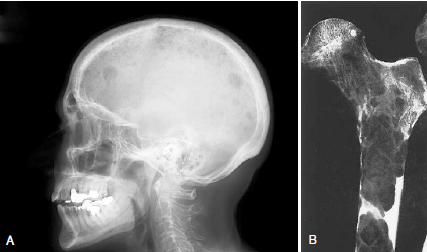Multiple Myeloma
Content of This Page
1- Introduction
2- Causes
3- Symptoms
4- Stages of The Disease
5- Treatment
6- What Should You Avoid
Introduction
Multiple myeloma is a type of cancer that originates in the plasma cells, a type of white blood cell found in the bone marrow. These abnormal plasma cells multiply uncontrollably, leading to the production of abnormal proteins that can damage bones, kidneys, and other organs. Common symptoms include bone pain, fatigue, frequent infections, and kidney issues. Treatment often involves a combination of chemotherapy, targeted therapies, and sometimes stem cell transplants to manage the disease and alleviate symptoms.

Causes
Genetic Mutations:
- Abnormalities in the DNA of plasma cells.
Age:
- The risk increases with age, typically affecting people over 65.
Family History:
- A family history of multiple myeloma or related blood disorders can increase risk.
Gender:
- More common in men than women.
Race/Ethnicity:
- Higher incidence in African Americans compared to Caucasians.
Exposure to Radiation:
- Previous exposure to high levels of radiation, such as from radiation therapy.
Certain Chemicals:
- Long-term exposure to specific chemicals or toxins may be linked to a higher risk.
Pre-existing Conditions:
- Conditions like monoclonal gammopathy of undetermined significance (MGUS) can be a precursor to multiple myeloma.
Symptoms
Bone Pain:
- Persistent pain, often in the back or ribs.
Fatigue:
- Persistent tiredness or weakness.
Frequent Infections:
- Increased susceptibility to infections due to weakened immune system.
Anemia:
- Low red blood cell count leading to pallor, dizziness, or shortness of breath.
Kidney Problems:
- Symptoms such as swelling in the legs, high blood pressure, or changes in urination.
Hypercalcemia:
- Elevated calcium levels in the blood, causing symptoms like confusion, excessive thirst, or frequent urination.
Unexplained Weight Loss:
- Loss of weight without a known cause.
Weakness or Numbness:
- Weakness or numbness in the arms or legs due to spinal cord compression.
Elevated Protein Levels:
- Abnormal levels of protein in the blood or urine.
Bone Fractures:
- Increased susceptibility to fractures due to weakened bones.

Stages of The Disease
1. International Staging System (ISS):
- Stage I:
- Beta-2 Microglobulin: Low levels
- Albumin: Normal levels
- Overall Health: Better prognosis, fewer complications.
- Stage II:
- Beta-2 Microglobulin: Intermediate levels
- Albumin: Low or normal
- Overall Health: Intermediate prognosis.
- Stage III:
- Beta-2 Microglobulin: High levels
- Albumin: Low levels
- Overall Health: Worse prognosis, more severe symptoms.
2. Durie-Salmon Staging System:
- Stage I:
- Bone Lesions: Few
- Hemoglobin Levels: Normal or only slightly reduced
- Calcium Levels: Normal
- Monoclonal Protein: Low levels
- Stage II:
- Bone Lesions: Intermediate number
- Hemoglobin Levels: Moderately reduced
- Calcium Levels: Elevated
- Monoclonal Protein: Intermediate levels
- Stage III:
- Bone Lesions: Multiple
- Hemoglobin Levels: Significantly reduced
- Calcium Levels: High
- Monoclonal Protein: High levels
Treatment
Chemotherapy:
- Uses drugs to kill or inhibit the growth of cancer cells.
Targeted Therapy:
- Drugs that specifically target cancer cells or the processes that help them grow, such as proteasome inhibitors or immunomodulatory drugs.
Immunotherapy:
- Enhances the body’s immune system to recognize and attack myeloma cells, including monoclonal antibodies and CAR T-cell therapy.
Stem Cell Transplant (Bone Marrow Transplant):
- Replaces damaged bone marrow with healthy stem cells, often following high-dose chemotherapy.
Radiation Therapy:
- Uses high-energy rays to target and destroy cancer cells in specific areas, such as bone lesions.
Bisphosphonates:
- Medications that help strengthen bones and reduce bone pain, often used to manage bone damage and prevent fractures.
Supportive Care:
- Includes treatments to manage symptoms and side effects, such as pain management, blood transfusions, and treatments for kidney issues.
Clinical Trials:
- Provides access to new and experimental treatments that may offer additional options for managing the disease.
What Should You Avoid
- Avoid infections.
- Consult your doctor about medications.
- Avoid raw or undercooked foods.
- Avoid high-risk activities.
- Avoid exposure to chemicals.
- Limit alcohol consumption.
- Avoid smoking.
- Avoid unnecessary procedures.
- Report any new or worsening symptoms.